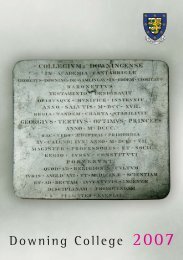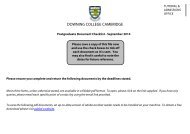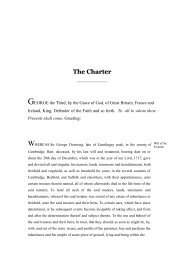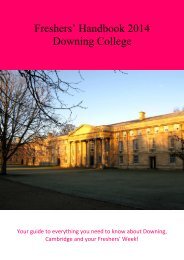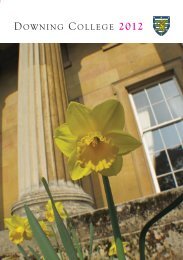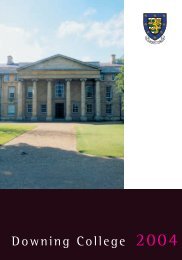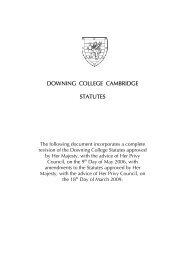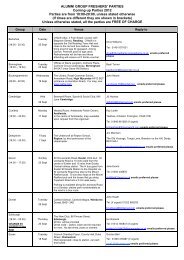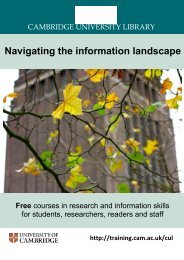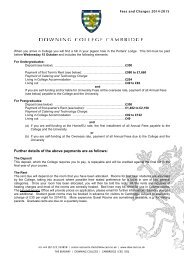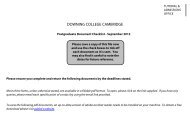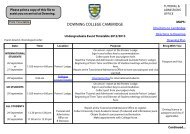veterinary students handbook the first two years - Downing College
veterinary students handbook the first two years - Downing College
veterinary students handbook the first two years - Downing College
Create successful ePaper yourself
Turn your PDF publications into a flip-book with our unique Google optimized e-Paper software.
Assessment and Exams<br />
Courses have been designed to allow <strong>students</strong>, wherever possible, to learn for <strong>the</strong>mselves ra<strong>the</strong>r than<br />
being passive recipients of instruction, and you will get far more out of your course and are more<br />
likely to do well in your exams if you regard university as an opportunity to study what interests you,<br />
ra<strong>the</strong>r than just learning a syllabus to pass an exam.<br />
You will encounter <strong>two</strong> kinds of assessment.<br />
Formative assessment is designed to indicate to you how you are progressing, on a weekly or termly<br />
basis. Your <strong>College</strong> supervisor is <strong>the</strong> person mainly responsible for providing this kind of feedback.<br />
Formative assessment, more or less informal, may also form part of some University-based teaching.<br />
Summative assessment (end of year exams) determines your ability to proceed with <strong>the</strong> rest of <strong>the</strong><br />
course. The main science courses in your <strong>first</strong> and second year will be examined for <strong>two</strong><br />
qualifications:<br />
• Second Vet MB, which determines whe<strong>the</strong>r you are able to proceed to <strong>the</strong> clinical part of<br />
your <strong>veterinary</strong> course;<br />
• Tripos, on <strong>the</strong> basis of which you are classed and will receive your BA degree. In addition to<br />
<strong>the</strong> main science courses, <strong>the</strong>re are o<strong>the</strong>r courses which are assessed only for <strong>the</strong> Second Vet<br />
MB.<br />
Each of <strong>the</strong> main summer exams in June is divided into three sections, and Sections I and II count for<br />
<strong>the</strong> Second Vet MB. The general format is a 1-hour <strong>the</strong>ory exam (Section I), which covers <strong>the</strong> lecture<br />
material and consists of MCQs or short notes, and a 1 or 2 hour practical exam (Section II) covering<br />
<strong>the</strong> practical material. Because <strong>the</strong>se Second Vet MB exams constitute a professional qualification,<br />
you will be expected to pass <strong>the</strong>se at a qualifying level, and to demonstrate a basic knowledge and<br />
understanding of <strong>the</strong> whole of <strong>the</strong> subject material in <strong>the</strong> courses. The marks obtained in <strong>the</strong>se <strong>two</strong><br />
sections will <strong>the</strong>n be added to those of Section III, to give a final Tripos mark.<br />
Students often ask, “How much do I need to know to pass <strong>the</strong> exams?” The bottom line is that to pass<br />
your professional qualification (Second Vet MB) you will be expected to show a good working<br />
knowledge of <strong>the</strong> subject material in all your courses. Fur<strong>the</strong>rmore, you will be expected not merely<br />
to know this material but, more importantly, to understand it and apply that understanding to <strong>the</strong><br />
solving of problems.<br />
Courses will provide you with <strong>the</strong> scientific knowledge which <strong>veterinary</strong> surgeons need to have in<br />
order to cope with today’s clinical practice, but we are also trying to show you that learning is a<br />
continuous process and that practitioners will have to continue to develop <strong>the</strong>ir knowledge and skills<br />
throughout <strong>the</strong>ir working careers. To do well in <strong>the</strong> Tripos, you will need to show a deeper<br />
understanding of <strong>the</strong> material, and to be able to marshal facts into coherent arguments.<br />
If you do not pass <strong>the</strong> Second Vet MB in June you will have one fur<strong>the</strong>r attempt at a separate Second<br />
Vet MB examination in September, unless <strong>the</strong>re are extenuating circumstances, such as illness or<br />
o<strong>the</strong>r good cause. If you require a third attempt, your <strong>College</strong> has to apply for this on your behalf to<br />
<strong>the</strong> Faculty Board of Veterinary Medicine.<br />
Section III consists of a 2-hour exam, during which you will be asked to write essays from a wide<br />
choice of topics; this section does not figure in your professional qualification, and <strong>the</strong> marks<br />
obtained count only towards your Tripos class.<br />
11



